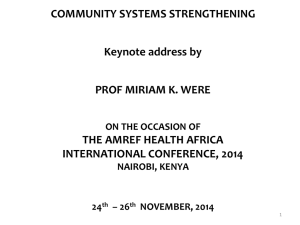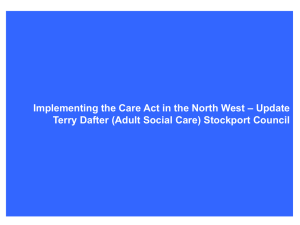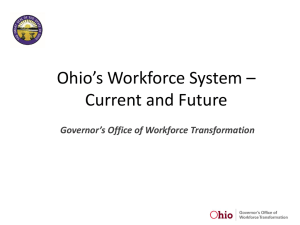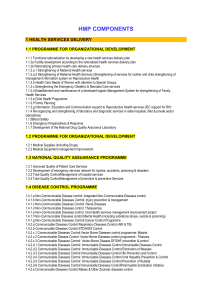Dr. Mphu Ramatlapeng
advertisement
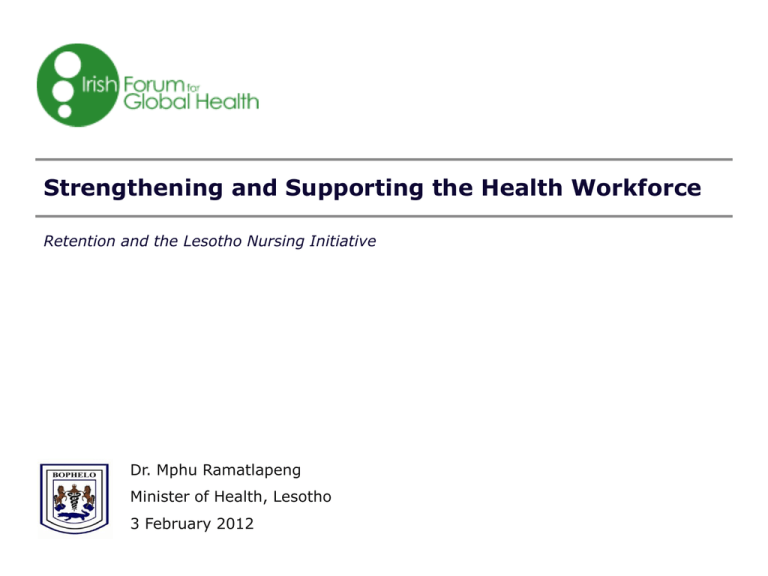
Strengthening and Supporting the Health Workforce Retention and the Lesotho Nursing Initiative Dr. Mphu Ramatlapeng Minister of Health, Lesotho 3 February 2012 Presentation Outline • Introduction • Brain Drain out of Sub-Saharan Africa • Push-Pull Factors • MOHSW-Irish Aid-Clinton Foundation Partnership • Challenges • Conclusion 2 • Strengthening and Supporting the Health Workforce • 3 February 2012 Introduction Sub-Saharan Africa: • The region is faced with high burden of communicable and non communicable diseases ( HIV and AIDs, Malaria, TB, Cancers and Diabetes) • Most of the countries in the region experience high demands of health care services due to the high demand of health care • However the supply of health professionals is low ( Doctors, Nurses pharmacists and others) • Efforts are being applied in the region to address the above mentioned challenges 3 • Strengthening and Supporting the Health Workforce • 3 February 2012 The “brain drain” of health care professionals out of subSaharan Africa has significant implications • A significant number of African-born health care professionals move abroad o ~65,000 African-born physicians and ~70,000 African-born nurses working overseas • A published BMJ article (Nov 2011) shows that lost investment from the emigration of physicians is significant − African-born physicians working abroad educated by Africa at a cost of over $2B USD − UK benefit: $2.7B USD − US benefit: $846M USD Source: BMJ 2011;343:d7031 “The financial cost of doctors emigrating from sub-Saharan Africa: human capital analysis”; AAU 2007 “Optimizing the African Brain Drain: Strategies for Mobilizing the Intellectual Diaspora towards Brain-Gain” 4 • Strengthening and Supporting the Health Workforce • 3 February 2012 This loss of local talent is due to a variety of “push” and “pull” factors that can be social, economical, or political Push Factors Pull Factors • Lack/limited jobs • Better jobs • Unsatisfactory pay • Higher pay • Limited opportunities for professional development • Greater opportunities for professional development • Poor social conditions • High quality of life • Political instability • Political stability 5 • Strengthening and Supporting the Health Workforce • 3 February 2012 Lesotho initiatives in addressing brain drain (1 / 2) Improvement of Infrastructure: • Refurbishment and construction of the health facilities and staff housing apartments • Provision of requisite equipment for all health facilities • Upgrading of the MOHSW communication systems (networks) Other Development strategies: • The country developed the health work force retention strategy and currently some components of the strategy are being implemented (e.g personal development, financial incentives) in collaboration with partners 6 • Strengthening and Supporting the Health Workforce • 3 February 2012 Lesotho initiatives in addressing brain drain (2 / 2) Other Development Strategies: • Health Systems Strengthening e.g the continuing education strategy was developed and its implementation commenced in March 2010 • Launching of the Nurse Education Partnership Initiative (NEPI) initiative to capacitate the nursing institutions • Family medicine residency program is being run to train young Basotho as specialists in family medicine • Establishment of wellness centers to cater for the health of workforce 7 • Strengthening and Supporting the Health Workforce • 3 February 2012 Challenges • Attrition of health care professionals continues to be high • Production of Health professionals by academic institutions is still low • Demand for health care continues to grow due to the increasing disease burden • Attainment of MDGs targets in accordance with the schedule 8 • Strengthening and Supporting the Health Workforce • 3 February 2012 Conclusion • The support from different partners played a significant role in improving the health status of all the citizens of Lesotho • The Government will keep accelerating the initiatives which are meant to address HR problems 9 • Strengthening and Supporting the Health Workforce • 3 February 2012 Thank You 10 • Strengthening and Supporting the Health Workforce • 3 February 2012




